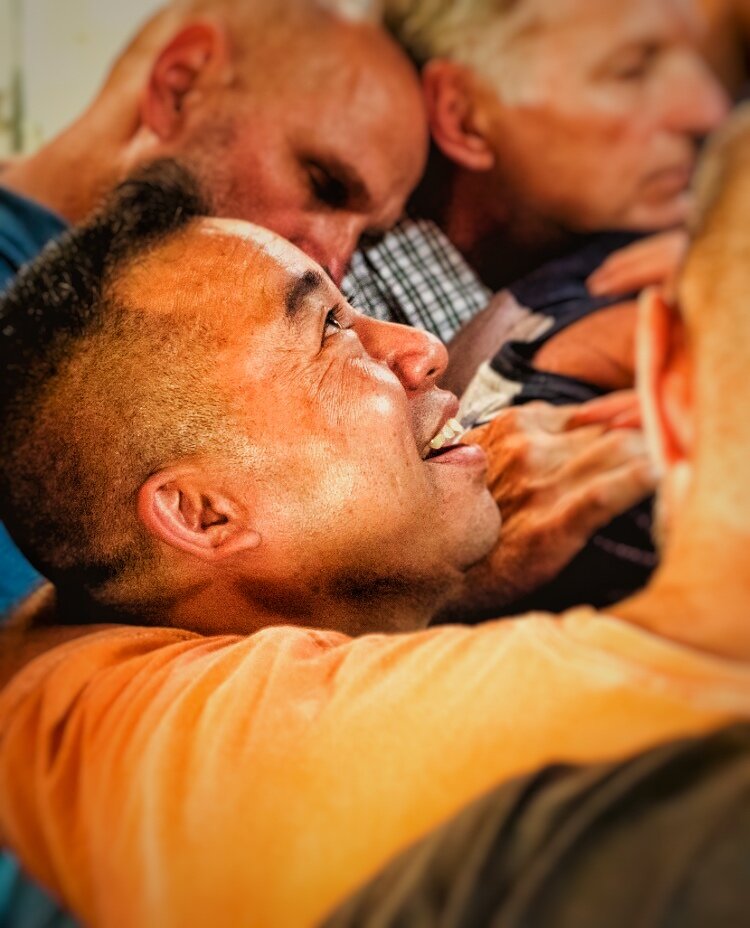
Inviting transformation within intractable contexts.
Fernando Ona is the Founder of the thiccgayze collective in the United States and the Netherlands. He is also a professor and a student.
Manifesting a collective for interspiritual/interritual care, yoga, and coaching by and for curvaceous gay men.
Interspiritual/Interritual Care
Envisioning interritual and interspiritual practices and shamanic strategies that seek to integrate spiritual care into healthcare settings and complex humanitarian emergencies.
Yoga
Engaging in trauma-responsive yoga classes, trainings and practices with thiccgayze. I provide personal yoga sessions and soon will be offering group classes. For more information, please reach out to me.
As a yoga practitioner, I completed my 200-hour teacher training from the Yoga and Ayurveda Center in the United States. I am currently in the process of going through an additional 300-hour yoga training. I recently completed the 300-hour yoga training in trauma-sensitive yoga (TCTSY-F) with the Trauma Center at JRI.
Somatic Coaching
Expanding vocational and professional calling with individuals and groups to support them in gaining self-awareness, clarifying goals, achieving their development objectives, unlocking their potential, and acting as a mindful sounding board.
If you are interested in learning more, please feel free to reach out to me.
What I mean by…
thicc or curvaceous: According to the Urban Dictionary, being thicc is when: “a person has fat the right places, creating sexy curves” (Citation: https://www.urbandictionary.com/define.php?term=Thicc). For me, being thicc or curvaceous is self-defined and is connected to a sense of being curvaceous or having curves whether it is physical, spiritual, social, cognitive, or emotional, or all of these together or in any combination.
gay: According to the British Stonewall organization, being gay refers to: “a man who has a romantic and/or sexual orientation towards men. Also a generic term for lesbian and gay sexuality - some women define themselves as gay rather than lesbian. Some non-binary people may also identify with this term” (Citation: https://www.stonewall.org.uk/help-advice/faqs-and-glossary/glossary-terms).
gender: I appreciate the work of Trans Student Educational Resource’s and the creation of the Gender Unicorn (https://transstudent.org/gender/). I lift up their definition of gender identity which TSER states is: “one’s internal sense of being male, female, neither of these, both, or another gender(s). Everyone has a gender identity, including you. For transgender people, their sex assigned at birth and their own internal sense of gender identity are not the same. Female, woman, and girl and male, man, and boy are also not necessarily linked to each other but are just six common gender identities”. (Citation: Trans Student Educational Resources, 2015. “The Gender Unicorn.” http://www.transstudent.org/gender.)
gaze: I was trained understand gaze from Michel Foucault’s concept of the clinical gaze in the context of a clinical encounter between doctor and patient. There are numerous resources on “the gaze” that have been published but I invite you to check out a University of Chicago blog, as a start: https://lucian.uchicago.edu/blogs/mediatheory/keywords/gaze/. Generally, I am interested in how “gaze” is connected to power and power dynamics within socio-cultural structures, specifically associated with structures and cultures of violence.